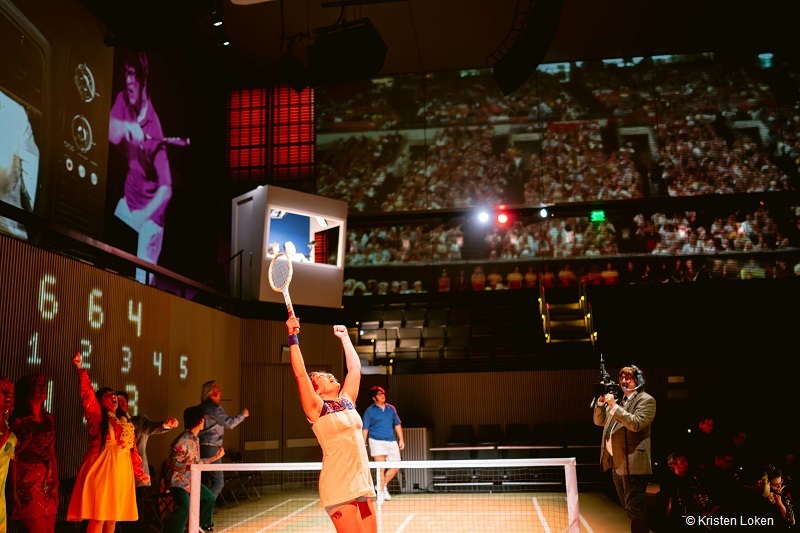
THE SING-AND-SWING HISTORICAL OPERA, IN DOUBLE-BILL
This operatic double-bill ended in rousing fashion, with the closing “Balls” improbably linkinga historic tennis match with singing in technological wizardry beyond anything we’ve encountered before, even on major stages.
In “Balls,” imagine reenacting the historic 1973 women’s lib tennis victory of Billie Jean King (without tennis balls) over the outspoken sexist Bobby Riggs, the single most publicized event of women’s sports coming of age, with 90 million viewing it worldwide. This required vintage televideo images, a videographer along the court, a live reenactment of the ponderous/portentous TV announcer Howard Cossell, splashy lighting effects and, of course, operatic singing by Riggs’ and King’s interpreters at midcourt, between racket swings.
Though thoroughly male, I found myself rooting for the female all the way.
The whole chamber-opera extravaganza, scaled down for the compact SF Jazz Center stage, came off resplendently, with nearly a dozen actor-singers in a rousing choral finale number at the April 5 opening night. Credit the Opera Parallèle production team of Brian Staufenbiel, David Murakami and Mextly Couzin, and the OP conductor Nicole Paiement unerringly leading the newly reduced orchestra of 16 producing the accents.
Throw in a bit of politics, a pop singer, even a mass all-female dry-land reenactment of Washington’s crossing the Delaware—-grab this multi-level entertainment and run freely with it.
Composer Laura Karpman and librettist Gail Collins—both women, of course!—created this imaginative rerun of women’s sport history with humor and delicacy, as much in the realm of music theater than of opera. The lead interpreter as King was mezzo Nicola Printz, plausibly swinging a tennis racket with abandon between gulped vocal lines and self-identifying as nonbinary, opposite tenor Nathan Granner as Riggs, who played the heavy with a light touch. King logged a victory payout of $100,000, plus untold publicity for all women’s sports.
Advantage, King!
The double-bill companion was the one-dimensional “Vinkensport” by David T. Little and Royce Vavrek, trying to swim upstream against the flood tide of “Balls.” Puccini had a one-dimensional aria in “La Boheme,” where the minor character Colline sings an ode to his overcoat, and it worked.
The satire “Vinkensport” however spends its whole evening on a birders’ confab, with six singers each bringing a caged pet finch and singing separately about the bird in mock-serious tones. Neither cute nor funny, “Vinkensport” lacks variants and gains little from the videos taken earlier of its (human) performers.
Despite the name of the venue, the operas had very minor jazz components. But, the auditorium has perfect sightlines and close-up access to performers.
MUSIC NOTES—Taking bows on stage with the cast was “Balls” composer Karpman, recently Oscar-nominated for her film score to “American Fiction.” Her animated choral-finale in “Balls” alone warrants a prize from someone, enkindling the Jazz Center crowd in a unique way.
INTIMATE OPERATIC DOUBLE-BILL, “Balls” and “Vinkensport,” presented by Opera Parallèle with conductor Nicole Paiement, Stage Director Brian Staufenbiel, April 5-7. SF Jazz Center, San Francisco. For jazz center info: (866) 920-5299 or go online, www.sfjazz.org.